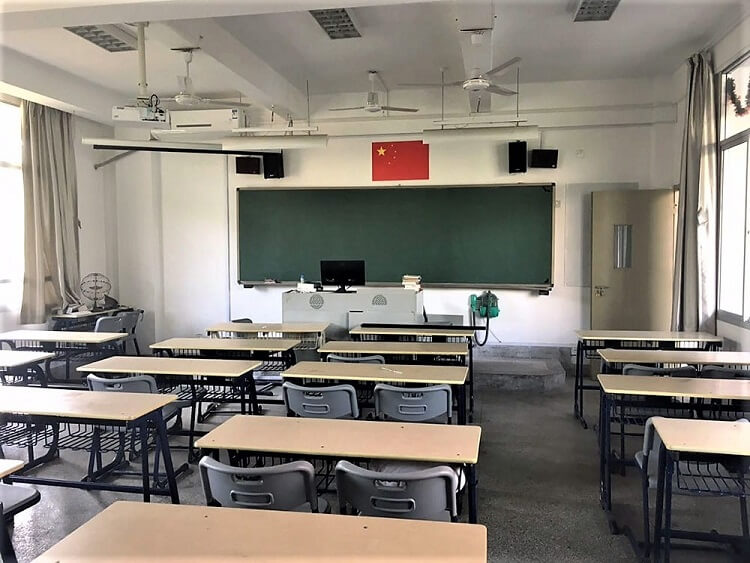You’ve probably heard a few tips when it comes to teaching English in China.
“Prepare for a different culture” and “pack the right clothes”, the so-called experts tell us.
These tips are neither helpful nor insightful.
So what does a China TEFL teacher really need to know?
Well, you’re in for a treat because I’ve put together a complete list.
(If you're pressed for time or not into detail, I recommend starting with the most common questions about teaching in China and then coming back to this blog).
OK, let's go!
Weighing up your options
1. Ask yourself three important questions at the start
What part of the world do I want to work in? What type of school do I want to teach at? What salary and working conditions am I prepared to accept? These are the three most important questions you should ask yourself at the start to help narrow down your options.
2. Consider China’s cost of living
Did you know that the cost of living in Chengdu (central China) is 58% cheaper than in Sydney, Australia? Along with a generous local salary and great perks (like return airfare), the cost of living is also an important factor in your decision to choose China as your teach abroad destination. I love this free tool by Expatistan which compares the cost of living between two cities.
3. Only rely on trustworthy sources
Do you really trust the TEFL information on Wikipedia? Moving overseas is a big move and it’s not worth the risk of going it alone. Experienced and reputable recruiters are a trustworthy source.

Make sure you do your research if you want to teach in China.
4. Beware of dodgy schools and job boards
Job boards like Dave’s ESL Café have loads of ads for teaching in China. While there are some good jobs available from reputable schools, make sure you do your research. There are plenty of teach in China scams.
5. Don’t teach in China
Believe it or not, there are some undesirable traits for a TEFL teacher in China to have. For example, being inflexible, not taking the job seriously, having unreasonable salary expectations and more.
Job requirements
6. You really do need a degree
Only dodgy schools hire teachers without a degree. The only exception is if you’re teaching in China as part of a reputable internship program (like this one run by ImmerQi). Interestingly, ABC Australia recently reported that two-thirds of the 400,000 foreigners teaching in China in 2017 were unqualified.
7. You also need a TEFL certificate
Unless you hold a bachelor’s degree (or higher) in education or teaching, then you must complete a TEFL course for China. You can compare top TEFL courses here or check out my review of some of the best online TEFL courses here.
Unless you're qualified to teach, you need a TEFL certificate for China.
8. You don’t need a CELTA
While a CELTA is a great certificate to have, you don’t need it for China. TEFL is enough. There’s a big debate about CELTA vs TEFL if you’re interested in finding out more.
9. Over 55? China is not for you
If you’re over age 55, your chances of getting a teaching job in China are slim. Although the official limit is 60, unless you’re already working in China as a mature-age teacher, you’re better off looking for a TEFL job in another country. The requirements to teach in China are getting tougher.
10. If you’re a non-native English speaker, expect hassles
The major, reputable teach in China recruiters (including Hello Teacher!) do not hire non-native English speakers. This is due to the strict guidelines set down by China. But as they say, where there’s a will there’s a way – you’ll still see job board ads that accept candidates who don’t meet the guidelines.
The country
11. China is enormous
Geographically, China is so big that the climate, language and culture in one corner of the country can be completely different to another corner. Choose where you want to teach as it will influence the kind of experience you will have in China.
12. See as much of the country as you can
Use China’s bullet trains to see as much of this stunning country as you can. Whether you explore Beijing’s famous hutongs (alleys) for a few hours, or you spend a few days in not-so-famous Fuzhou, treasure every moment. You may never return to China.
13. Don’t expect China to be like your country
China isn’t perfect. It’s technically still a developing country! If you think China is going to be like your country, it’s time to re-set your expectations. For example, the pollution in China is something that many foreigners struggle with.
In many parts of China you will experience pollution.
14. Consider teaching in a third-tier city
Although he works in bustling, modern Shenzhen, British teacher Tim Robinson believes smaller cities in China are worth considering. “You can save the same on half the salary in a third-tier town and have twice the experience, but you will have to be more adventurous,” he says. You can even go one step further and teach in rural China.
The recruitment process
15. Beware of dodgy agents and recruiters
Slimy agents or recruiters may receive a portion of your salary every month, without you even knowing it. Avoid these unscrupulous providers at all costs.
16. First impressions are lasting impressions
Make sure your resume is up to date and error-free. If you do get an interview, speak clearly and articulate why you would be a great teacher in China. And remember to dress well if your interview is on Zoom or Skype.
17. Ask lots of questions
To ensure you get the job and conditions that are right for you, ask your recruiter as many questions as possible before accepting a TEFL job offer. And once you arrive in China, ask the locals questions. The more you ask, the more you’ll discover!
Teaching contract
18. Go over your teaching contract carefully
You must be comfortable with everything in your China teaching contract before you sign it. Your recruiter can help you with this.

Read your contract carefully before you embark on your journey teaching in China.
19. Changing employers can be tricky
Leaving a school before a contract is up requires a letter of release from the school. This letter authorizes another school to register you with the government and enables the transfer of the resident permit. You should complete your contract unless there are exceptional circumstances for you to leave early.
Preparing
20. The visa process is more robust than it’s ever been
A few years ago, the China Z visa documentation requirements got a little stricter. Gone are the days where you could arrive as an unskilled foreigner and expect to get a teaching job straight away. Getting a visa to teach in China takes time so you need to plan in advance.
21. Travel insurance might save you
While you’ll receive basic medical insurance as part of your teaching contract, you should consider taking out travel insurance as well. This can cover things like evacuation, emergency dental work, trip cancellation, and your baggage and personal belongings.
22. Don’t buy the cheapest airfare
Once your contract is finalized, you’ll know how much money the school will reimburse you for your return flight. In most cases, the amount should be more than enough to fly with a reputable, full-service airline in economy class. There’s no need to fly with a no-frills airline! You can compare flights on sites like Skyscanner.
You can avoid no-frills airlines once you know how much the school will reimburse you for your flight.
23. Bring a few things with you
Bring your laptop, bank cards, unlocked phone, travel adapter, and any special medications or toiletries you use. It’s also a good idea to bring a few interesting teaching materials from your country, like foreign currency and restaurant menus.
24. Don’t bring expensive stuff
Apart from your laptop, don’t bring expensive stuff. You might lose it or, it in the case of clothing, get it dirty (things get dirty in China quickly!). There are some other things you should not bring to China too.
25. Learn about China before you arrive
If you’re unfamiliar with China and all its quirks, you could do some reading, check out some YouTube videos (like the comprehensive one below) or watch movies about China (The Joy Luck Club is still my favorite!).
Arriving
26. Register at the public security bureau (PSB)
Make sure your school takes you to the PSB (essentially the police station) straight away to register you as a foreigner living in China.
27. Check your apartment
If you’re teaching in the public sector, speak to your school contact if your apartment doesn’t have everything you need. If you’re teaching in the private sector, you may rent a furnished apartment. Simply buy any extra bits and pieces you need, like cutlery.

Typical housing for a TEFL teacher in China.
28. Get your address written in Chinese characters
This tip is a life-saver! Take a photo of your address on your phone. If you ever get lost, jump in a taxi and show it to the driver.
29. Get connected
Ask your school for help setting up a bank account and mobile phone, as well as connecting your apartment to the internet. Check out this very helpful arrival checklist for teaching in China.
Language and culture
30. You don’t need to speak a word of Mandarin
Even if you don’t know what ‘ni hao’ means, you can still teach English in China! Mandarin is not required at all. Some schools offer free Mandarin lessons for foreign teachers. If you’re feeling adventurous, you could learn some simple Mandarin phrases before you go.
31. Chinglish is rampant
The Chinglish language really does exist in China! It’s cute, it’s frustrating, and it’s very much engrained in English classrooms across the country.
You don't need to speak Chinese to teach in China.
32. Culture shock is real
Unless you’re totally bulletproof or you’ve been to China before, you’re going to get some form of culture shock in China. Don’t worry though – it’s normal and you’ll adjust fairly quickly.
33. You will become Chinese
The longer you spend time in this crazy country, the more Chinese you will become. I’m serious! But don’t fight it – embrace it. You’ll eventually start to enjoy karaoke and even jump queues.
34. Brace yourself for the weird and wonderful
From the quirky Chinese souvenirs you can find at the markets to the locals who sleep in Ikea, you’re bound to experience the weird, wacky and wonderful in China.
A Britney Spears cupcake - only in China!
35. Ignore the myths and the stereotypes
Well, not all of them. Spitting in China is still widespread. But things like “all Chinese people eat dog meat” and “no one can speak English” are simply untrue. China is full of surprises.
People
36. Chinese people are fundamentally good
There’s a tendency to be on your guard at first, to listen to tales of thievery and scams and believe it’s safer to assume the worst in people. But that’s a mistake. While you should still follow safety precautions in China, don’t let that get in the way of getting to know and trust the local people.
37. You’ll make friends (but it takes work)
Some EFL teachers in China find it easy to make local friends while others find it hard. Either way, you’ve got to put time and effort in to make friendships work.
You can make friends while teaching in China.
38. Establish your support network
Call home once a week, have a regular dinner with the other English teachers, attend a monthly expat WeChat or Meetup group – do whatever it is that drives you, makes you happy and gives you some structure.
39. Dating is not as easy as you think
Are you hoping to come to China to hook up with a local? Well, it may not be as easy as you think. Teacher Nicholas has written a blog on how hard Chinese dating is while teacher Kim explains the reasons why English teachers in China are single. If it’s all too hard, remember why you came to China in the first place – to teach English!
Food
40. You will find Western food in China
Although it might not be exactly what you’re used to, you will be able to find Western restaurants and food that will remind you a lot of home. For example, in most cities in China you’ll be able to find a decent steak restaurant where you can eat your meal in absolute comfort with a knife and fork.
41. Avoid McDonald’s and KFC
Sure, everyone feels like junk food now and again. But there are so many delicious kinds of Chinese food that you’d be silly to eat Western food every day. Plus, it’ll drain your bank account.
Avoid Western junk food in China.
Health and safety
42. Get jabbed before you go
Before you head off, get the right immunisations for China. See your doctor to find out what vaccinations and medicines you need.
43. China’s healthcare system is different
China doesn’t have doctor’s clinics like those in the USA, UK and Australia. If you get sick in China, you’ll be taken to see a doctor in an actual hospital. Hospitals are generally modern and clean but there might be a long wait. Don’t forget to bring your passport!
44. Look after your mental health
You may experience loneliness, anxiety, depression or other mental health issues while working and living in China. The good news is you can prepare for good mental health abroad.

Look after your mental health while teaching in China.
45. Don’t drink tap water
Tap water in China is unsafe to drink. Drink only bottled water or boiled water. Your tummy will thank you for it!
46. China is safe (apart from the water)
China is a safe country for foreign teachers. People will generally leave you alone, unless you ask for help. According to China Daily, in 2016 the homicide rate was 0.62 per 100,000 residents. What other country can boast statistics like that?
47. Pedestrian crossings are a free-for-all
Cars, motorcycles and bikes tend to use red lights as a suggestion to stop, rather than a blanket rule to stop. Even though you might have the right of way, a car might still blaze through the red light right in your direction. Always be on the lookout.

Be careful crossing the street!
48. Beware of scams
Be aware that scams do exist in foreign countries and China is no exception. While China is a safe country to work in and visit, you should learn how to protect yourself from scams.
Law
49. Respect the law
You’re subject to all local laws and penalties, including those that might seem harsh by Western standards. Gambling, prostitution and preaching your religion are illegal. The use or possession of even small quantities of ‘soft’ drugs, such as marijuana, is also illegal.

I saw this poster in Guangzhou. It says it all, really!
50. You must teach on a Z visa
If you work on any type of visa other than the Z visa, it can result in large fines, detention and deportation. Plain and simple.
51. Criminals, move on
In September 2018, TEFL teacher and former police officer Daniel Hiers was arrested in Shanghai for allegedly killing his wife and molesting a young girl in South Carolina. He was spotted on the US Marshals’ most wanted list by a Chinese student, after being on the run for 13 years. Nowadays, prospective teachers need their criminal record check legalized as part of the visa process.
Technology
52. Buy a VPN before you arrive
Major foreign websites and apps including WhatsApp, Facebook, Instagram, YouTube, Google and Gmail are blocked in China. You must get a VPN for China before you arrive, otherwise you'll be stuck! You can read my review of the best VPNs for China and choose the one that suits you best.

I can't imagine not being able to use Google to plan lessons!
53. Download your China apps
Download the best apps to use in China, like Google Translate, Didi (China’s Uber), and of course your VPN app.
54. Get used to paying on your phone
Chinese people link their bank card to apps like WeChat and use it to pay for stuff. And you can do it too! Many restaurants don’t even have menus anymore, instead they have a barcode you scan using WeChat so the menu appears on your phone.
Scan your phone to pay for food practically anywhere in China.
Shopping
55. It pays to shop around for TEFL certification
There are countless TEFL courses available. It’s hard to know what represents good value and what the minimum requirement is for China. That’s why you should rely on a TEFL China course specialist.
56. Haggle and don’t tip
Whether you’re shopping for clothes at the local market or taking a risk by riding in an unlicensed taxi, haggling is the norm in China. Just never, ever tip – it’s not part of the Chinese culture.
57. Forget about clothes shopping
Unless you have a small frame, forget about going clothes shopping in China. The same goes for shoes.
Travel and getting around
58. Trains are better than planes
The best and cheapest way of getting around this enormous country is by bullet train. The network is modern, extensive and most cities are connected this way. You’ll need your passport to go anywhere (as well as checking in to a hotel) so don’t travel without it. If you’re traveling to a far-flung place like Xinjiang, you’d be better off flying.
59. See some of China’s UNESCO World Heritage Sites
There are plenty of opportunities to go sightseeing while living in The Middle Kingdom. With 53 UNESCO World Heritage Sites to its name, China is only one site short of equaling Italy’s world-beating record. Many of the sites are largely unknown outside China despite their significance, such as the stunning Leshan Giant Buddha in Sichuan.
The Giant Buddha in Leshan is a UNESCO site.
60. Always carry toilet paper
In China, toilet paper is not provided in public restrooms. The last thing you want to contend with is a squat toilet with no paper, especially if you’re suffering from diarrhea in China. So always – and I repeat, always – bring toilet paper with you whenever you leave your apartment.
61. Fly to other countries in Asia in just a few hours
China is a stone’s throw from many Asian countries including South Korea, Japan, The Philippines, Thailand and Vietnam. Keep your eyes on cheap flights.
Adventure
62. Say ‘yes’ as much as you can
It’s easy to turn down a dinner invitation from a Chinese teacher and instead watch movies in your apartment all weekend. Get the most out of this once-in-a-lifetime experience and say ‘yes’ as much as you can.
63. You’ve got to be flexible
It’s probably one of the most important tips on this list. Having realistic expectations and a flexible attitude will help prepare you for the stress that can accompany living and working in a different culture.
64. Eat things you wouldn’t normally eat
I’m not saying eat gross food every day, but eat things you’d probably never try back home like chicken feet, duck tongue and pig brains. You might surprise yourself!
Try eating some weird stuff in China!
Salary and money
65. Some schools pay a lot more than others
Private training centers pay a lot more than public schools. The trade-off is longer hours, evening classes and a non-standard ‘weekend’ (e.g. Tuesday and Wednesday). I’ve written a whole blog on typical teacher salaries in China if you want to dig a bit deeper.
66. Don’t choose a teaching job based on salary alone
Choosing a teaching job in China based on salary alone is one of the biggest mistakes you can make. You need to equally consider factors like the school’s location, whether housing is included, working conditions, class size, and other benefits in the contract.

Don’t be blinded by money alone.
67. Bring enough money
Have a comfortable buffer of cash to see you through until you receive your first pay check a month later. You’ll also need rent money upfront if you teach at a private language institute in China (housing is included if you teach at a public school). If you choose to teach in a rich city like Shanghai, the first rent payment may be quite high.
68. If you’re smart, you’ll save
Thanks to China’s low cost of living and generous local salaries for TEFL teachers, China is one of the best countries where you can work and save money. While this couple saved $21,000 in a year teaching in China, they lived really frugally! You should at least be able to save up enough money to do some travelling around Asia before you head home.
Benefits
69. You’ll get holidays
You’ll get the national Chinese holidays off, including the oddly named Tomb Sweeping Day. You might get other time off too, such as Christmas. It depends on the school.
70. There are secret perks
You might already know about some of the main (and might I add, awesome) benefits of teaching English in China, like airfare reimbursement and free accommodation at some schools. But there are plenty of other benefits when you teach in China, like school activities, attending parties, making new friends and networking events.

There are numerous perks for English teachers in China.
71. You might pick up some other work
While most teaching contracts don’t allow for you to do other paid work, you might be able to do paid tutoring or even online teaching in your own time. Run it by the school first or risk getting into trouble.
72. TEFL in China can open up career doors
Teaching is a great way to start building your career in China. Take Jonathan Arthur, for example, who went from a teaching job to a marketing role in Shanghai, and Preston Thomas, who went from teaching to running a fancy restaurant in Beijing. And there are many more success stories!
Schools
73. Respect your host school
Be mindful that your host school has gone to great efforts to invite you to come and work with them. If there are any teething issues, communicate effectively and act professionally at all times.
74. Some schools are enormous
Some school campuses, especially universities, are enormous. It could take 15 minutes to walk from one classroom to the next. The solution? Buy a bike!

Ride your way from class to class!
75. Some schools are run like businesses
Unless you’re working in the public sector, your school may be privately owned. One of the common misconceptions about teaching abroad is that schools always have the students’ best interests at heart. You need to be comfortable with the concept of an educational enterprise that exists for profit.
76. Get to know the kind helpers
Some schools have designated student helpers. Find out who they are. Not only can they answer questions about the school, but they may also help you with things like translating, shopping and even taking you to the hospital.
Planning lessons
77. Carefully plan your lessons
If you’re teaching in a private language institute you’re probably going to have a set syllabus, textbook and lesson plans. Great! If you’re teaching in the public sector, however, you may have to create your own lessons from scratch. Teacher Nicholas says the GANAG lesson plan works every time.
78. Get your game on
Playing games in the classroom is a crucial part of teaching a foreign language. Students become more engaged, taught content is reinforced and class morale can increase. Even if you’re teaching in one of China’s large public classrooms with limited equipment, you can still run games that get everyone interacting.
79. Use multimedia to your advantage
If you have access to multimedia, use it! Your digital classroom in China might include a digital board. You could also plan lessons around movies or online videos.

If you have multimedia in your classroom you should incorporate it in your lesson planning.
80. Mix it up
Do lots of different activities in your classroom to keep your students on their toes. Things like short videos, stories, pictures, jokes, student projects and role-plays can all work well. Chinese students are very competitive so quizzes and competitions also work well.
81. Teaching can be stressful
While you’ll have a blast teaching English in China, at times it can still be stressful. Things may not go to plan, your students might cheat or be unmotivated, and your lessons may not hit the mark. Don't be too hard on yourself and just be the best person and teacher you can be.
In the classroom
82. Chinese students can be challenging
Young kids can be noisy, disruptive and may not understand you. On the other hand, older students are quiet, shy, passive learners. They’re afraid of making mistakes in public and losing face. Teaching in China will challenge you!
Young Chinese students can be naughty or nice!
83. Chinese students learn by rote
From a young age, Chinese students are expected to memorize a lot of information. They can therefore find it difficult to think outside the square, be creative and critically analyze information. You’ll need to find ways to work with this mindset.
84. Student punishment is different in China
Chinese students are used to being punished in ways that you may not be used to, such as public humiliation or involving the parents. Learn about student punishment in China to get a better understanding of classroom management.
85. Classroom facilities and equipment can vary greatly
You might have the latest in multimedia equipment or just a chalkboard – it all depends on the school.

A traditional Chinese classroom setup.
86. Never discuss the ‘three taboos’
If there’s only one classroom rule you follow as a TEFL teacher in China it’s this: never discuss politics, religion or sex. Ever.
87. Find out if you’ll have a teaching assistant
There are many benefits to having a teaching assistant (TA) in your ESL classroom in China. You won’t have a TA if you teach in the public sector, but you might if you teach at a private language center. Find out before you sign your contract.
88. You may teach more than English
Some schools may love you so much that they’ll ask you to teach subjects other than English, such as Western culture and history. According to British teacher Kim, who teaches in Zhenjiang, you should ask about this during the interview process. “Don’t assume that just because your training is in TEFL you’ll be teaching English,” he says.
Life as a teacher
89. Prepare to be photographed
If you teach English in Beijing, you’ll be just another foreigner. But if you end up in a smaller city, where 'laowai' are rare, someone might want to take a photo of you. It’s all part of the teach-in-China experience.
90. Expect the unexpected
Things don’t always go to plan in China. Rules and procedures can change without prior notice, timetables change and things never stand still. As a TEFL teacher in China, you need to be flexible and adaptable, and just go with the flow.
Things can change quickly in China so try and go with the flow.
91. Don’t whinge and complain
Try to focus on the great things about China and don’t sweat the small stuff. I’ve actually written a whole blog about the annoying things that TEFL teachers do in China. Constant whinging and complaining about China is my pet peeve (if it’s really that bad, why are you still there?).
92. Consider what you’ll do at the end of your contract
Should you stay or should you go? There are many things to consider towards the end of your teaching stint in China. Keep your school and recruiter informed along the way. Here's some helpful information when you change schools in China.
Summary of my teach in China tips
I hope you got a lot out of reading this epic list!
To summarize, when embarking on a journey to teach English in China you should:
- weigh up your teach abroad options and see if you meet the job requirements
- understand the recruitment process and what’s in your teaching contract
- prepare well and do some important things as soon as you arrive in China
- appreciate what makes China special, such as the language, people and food
- respect China’s culture and laws, and look after your health and safety
- make time for fun stuff like shopping and traveling
- receive a good salary and benefits, and build your career, and
- understand what the Chinese school environment is like.
Now I’d like to hear from you.
Which teaching English in China tip is the most helpful? And have I missed any tips?
Either way, let me know by leaving a comment below.







